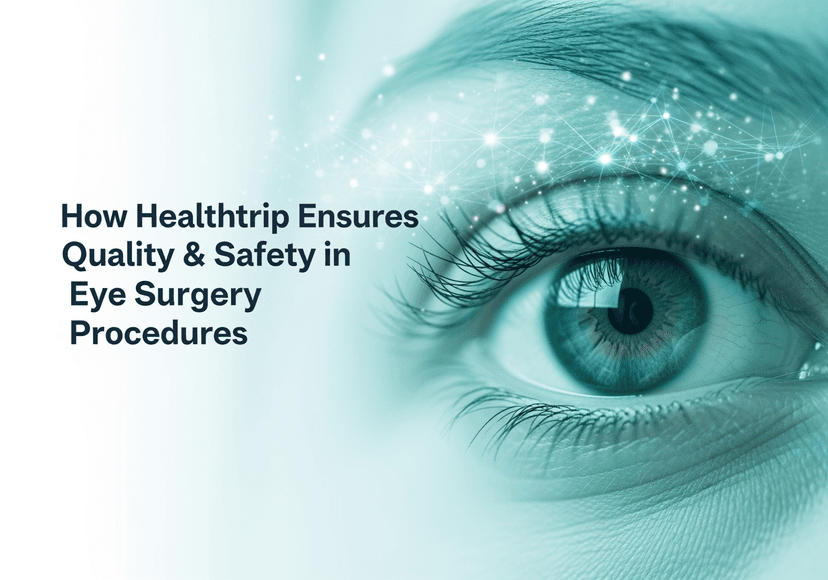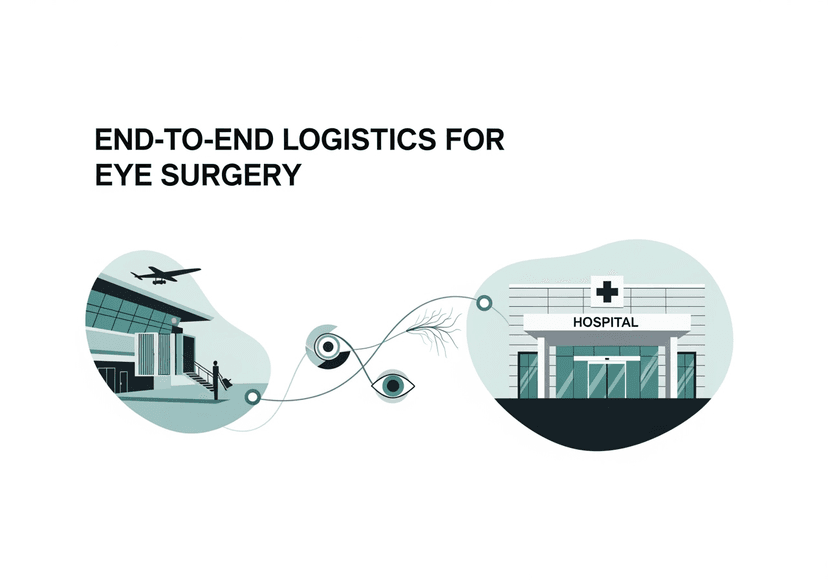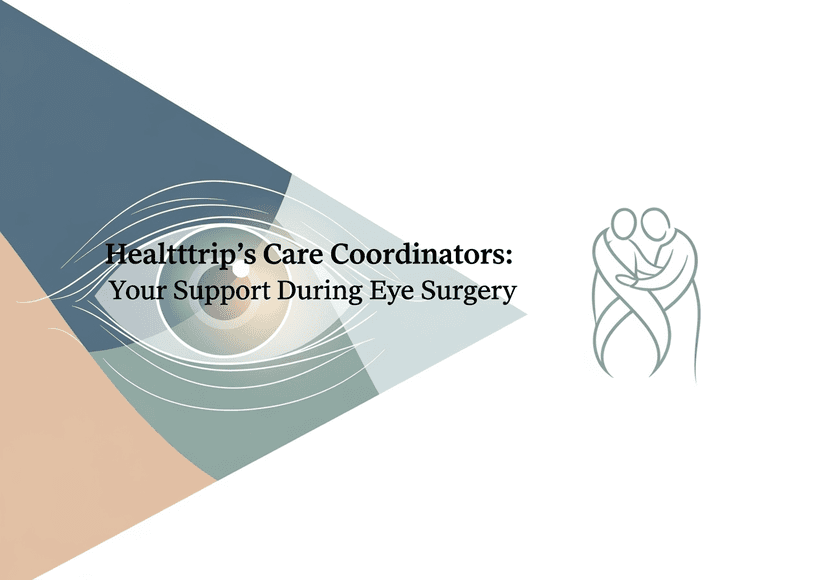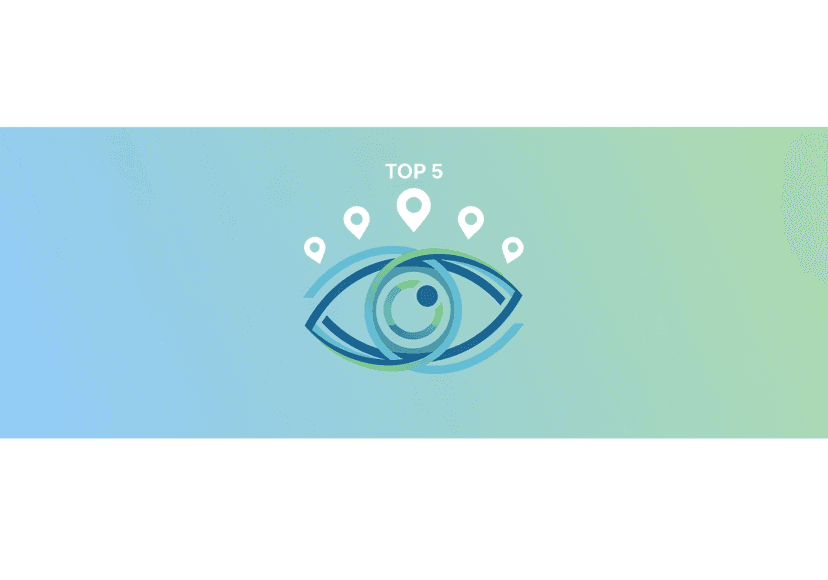
Is Eye Surgery Right for You? Healthtrip Explains Evaluation Steps
16 Oct, 2025
 Healthtrip
Healthtrip- Who is a Good Candidate for Eye Surgery?
- Exploring Different Types of Eye Surgeries
- The Pre-Operative Evaluation: What to Expect
- Where Can You Get Eye Surgery? Renowned Hospitals
- Potential Risks and Benefits of Eye Surgery < li>Understanding the Costs Associated with Eye Surgery
- Patient Experiences: Real Stories of Eye Surgery
- Post-Operative Care and Recovery
- Conclusion: Making an Informed Decision
Understanding Your Vision Correction Options
Before diving into the evaluation process, it's crucial to understand that "eye surgery" isn't a one-size-fits-all solution. There's a whole world of procedures out there, each designed to address specific vision problems. LASIK (Laser-Assisted In Situ Keratomileusis) is perhaps the most well-known, using a laser to reshape the cornea and correct nearsightedness, farsightedness, and astigmatism. Then there's PRK (Photorefractive Keratectomy), another laser-based procedure that's often a good option for people with thinner corneas. For those with cataracts, cataract surgery involves removing the cloudy lens and replacing it with an artificial one. With so many options available at leading hospitals like Memorial Sisli Hospital and LIV Hospital, its no wonder you might feel overwhelmed. At Healthtrip, we help cut through the confusion by providing detailed information about each procedure, along with personalized consultations to determine which one is best suited for your unique needs and vision goals. We also consider your lifestyle, occupation, and overall health to ensure a safe and effective outcome, helping you navigate the complexities of modern vision correction and find the perfect path to clearer, brighter sight.
Most popular procedures in India
Initial Consultation and Eye Exam
The first step on your journey to better vision is a comprehensive consultation with an ophthalmologist. This isn't just a quick check-up; it's an in-depth assessment of your eye health and a crucial opportunity to discuss your vision goals and expectations. During this consultation, the doctor will review your medical history, including any eye conditions, medications, or allergies you may have. They'll also perform a series of tests to evaluate your vision, measure your corneal thickness, and assess the overall health of your eyes. This includes checking for conditions like glaucoma, cataracts, and macular degeneration, which could affect your suitability for certain procedures. Don't be shy about asking questions! This is your chance to get all the information you need to make an informed decision, and discussing realistic expectations about potential outcomes and possible risks is essential. Healthtrip connects you with experienced ophthalmologists at facilities such as Fortis Memorial Research Institute, Gurgaon and Max Healthcare Saket, known for their comprehensive evaluations and personalized care. Prepare to have your eyes thoroughly examined but more importantly, prepare to have all your anxieties put to rest.
Wellness Treatments
Give yourself the time to relax
Lowest Prices Guaranteed!

Lowest Prices Guaranteed!
Corneal Topography and Wavefront Analysis
Think of corneal topography and wavefront analysis as creating a detailed map of your eye's surface. Corneal topography maps the curvature of your cornea, the clear front surface of your eye. This is essential for determining if you have any irregularities that could affect the outcome of surgery. Wavefront analysis, on the other hand, goes a step further by measuring the way light travels through your eye, identifying even the most subtle imperfections. This advanced technology can help customize the procedure to your unique visual needs, potentially resulting in sharper, clearer vision than traditional methods. These tests are particularly important for procedures like LASIK and PRK, where the cornea is reshaped to correct vision. At Healthtrip, we ensure that you have access to state-of-the-art diagnostic equipment at our partner hospitals like Quironsalud Hospital Murcia and Jiménez Díaz Foundation University Hospital, allowing for the most precise and personalized treatment plans. It's all about getting a complete picture of your eyes to ensure the best possible outcome for your vision correction journey. Getting these tests done is like getting a bespoke suit fitted, it's made just for you.
Pupil Size Measurement and Dry Eye Evaluation
While often overlooked, pupil size and tear film quality play a significant role in the success and comfort of eye surgery. Large pupils, especially in low light conditions, can increase the risk of glare, halos, and night vision problems after certain procedures. Measuring your pupil size helps the surgeon determine the optimal treatment area and choose the most appropriate surgical technique. Similarly, dry eyes can be exacerbated by eye surgery, leading to discomfort and blurred vision. A thorough dry eye evaluation assesses the quantity and quality of your tears, identifying any underlying issues that need to be addressed before surgery. This may involve treatments like artificial tears, prescription eye drops, or other therapies to improve tear production and reduce inflammation. Remember, a healthy ocular surface is essential for optimal healing and visual outcomes. Healthtrip recognizes the importance of these often-overlooked factors, ensuring that your evaluation includes a comprehensive assessment of both pupil size and tear film quality at trusted hospitals such as BNH Hospital and Bangkok Hospital. Because at the end of the day, clear vision shouldn't come at the cost of comfort.
Overall Health Assessment and Lifestyle Considerations
Your overall health and lifestyle play a surprising role in determining your suitability for eye surgery. Certain medical conditions, such as autoimmune diseases, uncontrolled diabetes, and some eye diseases, can increase the risk of complications or affect the healing process. Similarly, certain medications, like steroids and some blood thinners, can interfere with surgery and recovery. It's essential to be upfront and honest with your doctor about your medical history and any medications you're taking. Lifestyle factors, such as smoking, can also impact healing and increase the risk of dry eyes. Additionally, your occupation and hobbies may influence the type of procedure that's best for you. For example, someone who works outdoors or participates in contact sports may be better suited for PRK than LASIK. At Healthtrip, we work with a network of experienced medical professionals at facilities like The Royal Marsden Private Care, London and Cleveland Clinic London who take a holistic approach to eye surgery, considering your overall health, lifestyle, and vision goals to create a personalized treatment plan that's right for you. We believe that informed decisions lead to better outcomes, and we're here to support you every step of the way.
Who is a Good Candidate for Eye Surgery?
Embarking on the journey of eye surgery is a significant decision, one that necessitates careful consideration of individual circumstances and specific eye conditions. Not everyone is an ideal candidate, and understanding the criteria for suitability is paramount. Generally, a good candidate is someone experiencing visual impairment that significantly impacts their daily life, despite the use of glasses or contact lenses. This impairment could stem from refractive errors like nearsightedness (myopia), farsightedness (hyperopia), or astigmatism, or more complex conditions such as cataracts. Moreover, the individual should be in good overall health, as certain systemic diseases can affect the healing process and increase the risk of complications. Stable vision is also a key factor; ideally, your eye prescription should have remained relatively consistent for at least a year prior to surgery. This stability indicates that the underlying eye condition isn't rapidly progressing, which could compromise the long-term success of the procedure. Don’t worry, the professionals at facilities like Fortis Memorial Research Institute, Gurgaon, will assess your situation with precision, and they'll help you understand all these details in a way that makes sense.
Beyond these fundamental requirements, age and lifestyle play a crucial role. While there isn't a strict age limit, younger individuals generally experience better outcomes due to their body's natural healing capabilities. Conversely, older adults might need to consider the potential impact of age-related eye conditions like presbyopia (age-related farsightedness), which can affect the choice of surgical procedure. Lifestyle factors such as occupation and hobbies are also relevant; for instance, individuals involved in activities that pose a high risk of eye injury might need to weigh the benefits carefully. Ultimately, determining candidacy involves a thorough eye examination by an experienced ophthalmologist who can assess your overall eye health, discuss your visual goals, and explain the potential risks and benefits of each surgical option. This comprehensive evaluation ensures that you're making an informed decision that aligns with your individual needs and expectations. Healthtrip can help you connect with top-notch specialists at hospitals like Breyer, Kaymak & Klabe Augenchirurgie who can guide you through this process with expertise and care.
Exploring Different Types of Eye Surgeries
The realm of eye surgery has undergone a remarkable transformation in recent years. A diverse range of procedures are now available to address a wide spectrum of vision problems, from common refractive errors to complex eye diseases. Laser-assisted in situ keratomileusis (LASIK) remains one of the most popular choices for correcting nearsightedness, farsightedness, and astigmatism. This procedure utilizes a laser to reshape the cornea, allowing light to focus more accurately on the retina and improve vision. Photorefractive keratectomy (PRK) is another laser vision correction technique, often preferred for individuals with thinner corneas or those at a higher risk of eye injury. Unlike LASIK, PRK involves removing the outer layer of the cornea before reshaping the underlying tissue with a laser. Refractive Lens Exchange (RLE) is an alternative option, particularly suitable for individuals with high degrees of refractive error or early signs of cataracts. During RLE, the natural lens of the eye is replaced with an artificial intraocular lens (IOL) to correct vision. Hospitals like Yanhee International Hospital offer consultations to discuss these procedures in detail.
Cataract surgery is another incredibly common and successful procedure, designed to restore vision clouded by cataracts. This involves removing the cloudy natural lens and replacing it with a clear artificial lens. Modern cataract surgery often utilizes phacoemulsification, a technique that uses ultrasound energy to break up the cataract into small pieces for easier removal. Glaucoma surgery aims to lower intraocular pressure and prevent further damage to the optic nerve. Various surgical techniques are available, ranging from minimally invasive glaucoma surgery (MIGS) to more traditional procedures like trabeculectomy. For those facing retinal issues, vitrectomy is a crucial surgical option. It involves removing the vitreous gel, which fills the eye, allowing surgeons to access and treat retinal detachments, macular holes, and other retinal problems. Each type of eye surgery comes with its own set of benefits, risks, and recovery timelines. Understanding the nuances of each procedure is essential for making an informed decision about your vision correction journey, and Healthtrip can help you find the best options at leading hospitals like Vejthani Hospital.
The Pre-Operative Evaluation: What to Expect
Before undergoing any eye surgery, a comprehensive pre-operative evaluation is absolutely essential. This thorough assessment serves to determine your suitability for the procedure, identify potential risks, and ensure that you're fully informed about what to expect during and after the surgery. The evaluation typically begins with a detailed review of your medical history, including any existing eye conditions, systemic diseases, and medications you're currently taking. It’s crucial to be open and honest with your ophthalmologist about your health concerns, as this information can significantly impact the surgical plan. A complete eye examination follows, which assesses various aspects of your vision and eye health. This typically includes measuring your visual acuity, refraction (to determine your prescription), intraocular pressure (to screen for glaucoma), and corneal thickness. The ophthalmologist will also examine the structures of your eye, including the cornea, lens, retina, and optic nerve, to identify any abnormalities or potential issues. Institutions such as Saudi German Hospital Cairo, Egypt, prioritize this kind of comprehensive evaluation.
In addition to these standard tests, your ophthalmologist may perform specialized diagnostic procedures to gather more detailed information about your eye condition. Corneal topography maps the surface of your cornea to detect irregularities or distortions. Optical coherence tomography (OCT) provides cross-sectional images of the retina and optic nerve, allowing for the detection of subtle changes that might not be visible during a regular eye exam. These advanced imaging techniques help the surgeon to create a highly personalized surgical plan that maximizes the chances of success and minimizes the risk of complications. During the pre-operative evaluation, your ophthalmologist will also discuss the specific surgical procedure in detail, explaining the steps involved, the potential benefits, and the possible risks and side effects. This is your opportunity to ask questions and address any concerns you may have. A clear understanding of the procedure and its implications is crucial for making an informed decision and ensuring a positive surgical experience. Healthtrip can connect you with hospitals such as Memorial Sisli Hospital that emphasize patient education and transparent communication throughout the pre-operative process.
Also Read:
Where Can You Get Eye Surgery? Renowned Hospitals
Choosing the right hospital for your eye surgery is a critical decision that can significantly impact the outcome and your overall experience. Healthtrip understands this importance, and we partner with a network of world-class hospitals and clinics that offer cutting-edge technology, experienced surgeons, and comprehensive care. When considering options for eye surgery, it’s essential to look at facilities with a proven track record, positive patient testimonials, and accreditation from reputable organizations. Remember, your vision is precious, and entrusting it to a capable and reliable medical institution is paramount. Let's explore some of the renowned hospitals where you can get eye surgery, keeping in mind both the geographical diversity and the specialized services they offer.
For those seeking treatment in the Middle East, the Saudi German Hospital Cairo, Egypt, stands out as a leading healthcare provider. Located in Cairo, this hospital is part of a larger network known for its high standards of medical care and state-of-the-art facilities. They offer a wide range of ophthalmic services, including cataract surgery, LASIK, and treatments for other eye conditions. Similarly, NMC Specialty Hospital, Al Nahda, Dubai, is another excellent choice, providing comprehensive eye care services with a focus on patient comfort and advanced surgical techniques. In Turkey, Memorial Sisli Hospital, Istanbul, is renowned for its multidisciplinary approach and cutting-edge technology. The hospital's ophthalmology department is staffed with experienced surgeons who specialize in various eye surgeries, ensuring patients receive personalized treatment plans.
Venturing into Europe, Breyer, Kaymak & Klabe Augenchirurgie in Düsseldorf, Germany, is a highly regarded eye surgery center. They are known for their expertise in refractive surgery, including LASIK and other vision correction procedures. The clinic's commitment to using the latest technology and providing individualized care makes it a popular choice for international patients. In Thailand, both Yanhee International Hospital and Vejthani Hospital in Bangkok are excellent choices for eye surgery. These hospitals are well-equipped with modern facilities and skilled surgeons, offering a range of ophthalmic services at competitive prices. If you're exploring options in India, Fortis Escorts Heart Institute, New Delhi, and Fortis Shalimar Bagh, Delhi, provide comprehensive eye care with experienced ophthalmologists and advanced diagnostic tools. Max Healthcare Saket, also in New Delhi, is another leading hospital known for its high-quality medical services and patient-centric approach.
Ultimately, the best hospital for your eye surgery will depend on your specific needs, preferences, and location. Healthtrip can assist you in navigating these options, providing detailed information about each hospital, surgeon profiles, and patient reviews. We help facilitate your journey by arranging consultations, managing travel logistics, and ensuring you receive the best possible care. Remember, choosing the right hospital is a crucial step towards achieving optimal results and a positive surgical experience. Don't hesitate to explore all your options and seek professional guidance to make an informed decision.
Potential Risks and Benefits of Eye Surgery
Deciding to undergo eye surgery is a significant decision that requires careful consideration of both the potential risks and benefits. It's essential to have a balanced understanding of what you can realistically expect from the procedure, and how it might impact your vision and overall quality of life. While eye surgery can offer remarkable improvements and life-changing results, it's not without potential risks, and being well-informed is crucial for making the right choice. Healthtrip believes in empowering patients with knowledge so they can approach eye surgery with confidence and realistic expectations. Let's delve into the various benefits and risks associated with these procedures.
On the benefit side, many eye surgeries offer the prospect of improved vision, reduced dependency on glasses or contact lenses, and a better quality of life. For instance, cataract surgery can restore clear vision by replacing a clouded lens with an artificial one, allowing individuals to see the world with renewed clarity. LASIK and other refractive surgeries can correct nearsightedness, farsightedness, and astigmatism, potentially eliminating the need for corrective eyewear altogether. These procedures can be particularly appealing to those who find glasses or contacts inconvenient or uncomfortable. Furthermore, certain eye surgeries can prevent further vision loss or even restore some vision in cases of glaucoma, diabetic retinopathy, and other serious eye conditions. The ability to regain lost vision or prevent further deterioration can have a profound impact on a person's ability to work, enjoy hobbies, and maintain their independence.
However, it’s equally important to be aware of the potential risks involved. Like any surgical procedure, eye surgery carries certain risks, including infection, bleeding, and adverse reactions to anesthesia. Specific to eye surgeries, there are also risks such as dry eye syndrome, glare, halos around lights, and under- or over-correction, which may require additional procedures. In rare cases, more serious complications such as vision loss or corneal damage can occur. It’s important to note that the risks associated with each type of eye surgery can vary, and the likelihood of experiencing complications depends on factors such as your individual health, the specific procedure being performed, and the surgeon's experience. A thorough discussion with your ophthalmologist is crucial to fully understand the potential risks and benefits in your specific case.
Healthtrip encourages patients to ask detailed questions about the procedure, the surgeon's experience, and the expected outcomes. We can help you find qualified and experienced ophthalmologists who can provide a comprehensive evaluation and discuss the risks and benefits in detail. Remember, informed consent is a critical part of the process, and you should feel comfortable and confident in your decision before proceeding with any eye surgery. By weighing the potential benefits against the possible risks and working closely with your healthcare provider, you can make an informed choice that aligns with your vision goals and overall health.
Also Read:
Understanding the Costs Associated with Eye Surgery
Navigating the financial aspects of eye surgery can often be a daunting task. The costs can vary significantly depending on the type of procedure, the location of the hospital or clinic, the surgeon’s fees, and other related expenses. It's crucial to have a clear understanding of all the costs involved to make an informed decision and avoid any unexpected financial burdens. Healthtrip is committed to providing transparent information about the costs associated with eye surgery, helping you plan your medical journey with confidence. Let’s break down the different factors that contribute to the overall cost of eye surgery.
The type of eye surgery you need will significantly impact the cost. For example, cataract surgery is generally less expensive than more complex procedures like corneal transplants or glaucoma surgery. Refractive surgeries like LASIK can also vary in price depending on the technology used and the extent of correction required. The surgeon's fees are another major component of the cost. Highly experienced and renowned surgeons may charge more for their services. However, it's important to remember that expertise and skill can contribute to better outcomes and fewer complications. The location of the hospital or clinic also plays a significant role. Hospitals in metropolitan areas or developed countries tend to have higher costs compared to those in smaller cities or countries with lower healthcare costs. For instance, undergoing eye surgery in Thailand or India might be more affordable than in the United States or Europe.
In addition to the surgeon's fees and hospital charges, there are other expenses to consider. These may include pre-operative evaluations, post-operative care, medications, and follow-up appointments. If you are traveling for surgery, you'll also need to factor in travel costs, accommodation, and living expenses. It's essential to inquire about all these additional costs upfront to get a comprehensive estimate. Health insurance coverage for eye surgery can vary widely depending on your insurance plan and the specific procedure. Some insurance plans may cover cataract surgery and other medically necessary procedures, while others may not cover elective surgeries like LASIK. It's crucial to check with your insurance provider to understand your coverage and any out-of-pocket expenses you may incur.
Healthtrip can assist you in obtaining cost estimates from different hospitals and clinics, helping you compare prices and find the best option for your budget. We can also provide information about financing options and payment plans that may be available. Remember, while cost is an important factor, it shouldn't be the only consideration. It's equally important to choose a qualified and experienced surgeon and a reputable medical facility to ensure the best possible outcome. By carefully evaluating all the costs involved and exploring your financing options, you can make an informed decision and plan your eye surgery with peace of mind.
Patient Experiences: Real Stories of Eye Surgery
Hearing directly from individuals who have undergone eye surgery can provide invaluable insights and help you gain a realistic understanding of what to expect. Patient experiences offer a glimpse into the entire journey, from the initial consultation to the post-operative recovery, and can address common concerns and anxieties. Healthtrip believes that sharing these real-life stories can empower you to make an informed decision and approach your own eye surgery with greater confidence. Let’s explore some patient experiences to understand the impact of eye surgery on their lives.
One common narrative revolves around cataract surgery, a procedure that has transformed the lives of countless individuals. Many patients describe the experience as a "miracle," highlighting the dramatic improvement in their vision and overall quality of life. They often share stories of how they could no longer enjoy simple activities like reading, driving, or recognizing faces due to clouded vision. After cataract surgery, they are able to see the world with renewed clarity, rediscover their passions, and regain their independence. These stories often emphasize the importance of choosing an experienced surgeon and a reputable hospital to ensure a successful outcome.
LASIK surgery is another popular topic in patient testimonials. Many individuals who have undergone LASIK share their excitement about being free from glasses and contact lenses. They describe the procedure as quick and relatively painless, with noticeable improvements in their vision within a day or two. These patients often express a sense of liberation and increased confidence, as they no longer have to worry about the inconvenience and limitations of corrective eyewear. However, they also emphasize the importance of carefully following post-operative instructions and attending follow-up appointments to ensure proper healing and optimal results. It's important to acknowledge that not all patient experiences are entirely positive. Some individuals may encounter complications or experience less-than-perfect outcomes. These stories serve as a reminder that eye surgery is not without risks, and it's crucial to have realistic expectations and discuss potential concerns with your surgeon.
Healthtrip encourages patients to research and read multiple testimonials to get a comprehensive perspective. We can connect you with former patients who are willing to share their experiences and answer your questions. Remember, every individual's journey is unique, and what works for one person may not work for another. By learning from the experiences of others and working closely with your healthcare provider, you can make an informed decision and approach your eye surgery with confidence and realistic expectations. Listening to real stories helps paint a vivid picture, replacing uncertainty with a sense of preparedness and hope.
Post-Operative Care and Recovery
The period following eye surgery is crucial for ensuring optimal healing and achieving the best possible visual outcome. Proper post-operative care and adherence to your surgeon's instructions are essential for minimizing the risk of complications and maximizing the benefits of the procedure. Healthtrip understands the importance of this phase and provides comprehensive information and support to help you navigate the recovery process with confidence. Let’s delve into the key aspects of post-operative care and what you can expect during the recovery period.
Immediately after surgery, you'll likely experience some discomfort, such as mild pain, itching, or a gritty sensation in your eye. Your surgeon will prescribe pain medication and eye drops to alleviate these symptoms and prevent infection. It's crucial to follow the prescribed medication schedule and use the eye drops as directed. In the initial days after surgery, it's important to protect your eye from injury and infection. You may be advised to wear an eye shield, especially while sleeping, to prevent accidental rubbing or bumping. Avoiding strenuous activities, heavy lifting, and exposure to dust, smoke, and other irritants is also essential. Keeping your eye clean and dry is crucial for preventing infection. You should avoid swimming, using hot tubs, and touching your eye with unwashed hands. Gently cleaning around your eye with a clean, damp cloth is usually recommended to remove any discharge or crusting.
Follow-up appointments are an integral part of post-operative care. Your surgeon will schedule regular check-ups to monitor your healing progress, assess your vision, and address any concerns you may have. These appointments are essential for detecting and managing any potential complications early on. The recovery period can vary depending on the type of eye surgery you've undergone. For cataract surgery, vision typically improves within a few days, and full recovery may take a few weeks. For LASIK and other refractive surgeries, vision may fluctuate in the initial days, and it can take several weeks or months to stabilize. It's important to be patient and allow your eye the time it needs to heal fully. During the recovery period, it's essential to be aware of any warning signs of complications, such as sudden vision loss, severe pain, redness, swelling, or discharge. If you experience any of these symptoms, you should contact your surgeon immediately.
Healthtrip provides ongoing support and guidance throughout your recovery journey. We can connect you with resources and support groups to help you manage your expectations and address any concerns you may have. Remember, proper post-operative care is essential for achieving the best possible outcome from your eye surgery. By following your surgeon's instructions, attending follow-up appointments, and being vigilant about any potential complications, you can ensure a smooth and successful recovery.
Also Read:
Conclusion: Making an Informed Decision
Undergoing eye surgery is a life-altering decision that can significantly improve your vision and overall quality of life. However, it’s a decision that should be made with careful consideration, thorough research, and a clear understanding of the potential risks and benefits. Healthtrip is dedicated to empowering you with the knowledge and resources you need to make an informed choice and embark on your journey with confidence. Let's recap the key factors to consider as you navigate your options.
Firstly, it's crucial to understand your specific eye condition and the available treatment options. Consult with a qualified ophthalmologist to get a comprehensive evaluation and discuss the potential benefits and risks of each procedure. Explore different hospitals and clinics, considering their reputation, technology, and the experience of their surgeons. Healthtrip can assist you in finding reputable medical facilities and connecting with experienced healthcare professionals. Don't hesitate to ask questions and seek second opinions to ensure you have a clear understanding of your options. Consider the costs associated with eye surgery, including surgeon's fees, hospital charges, pre-operative evaluations, post-operative care, and travel expenses. Healthtrip can provide cost estimates from different hospitals and clinics and help you explore financing options and payment plans.
Read patient testimonials and connect with individuals who have undergone similar procedures to gain valuable insights and realistic expectations. Understand the importance of post-operative care and be prepared to follow your surgeon's instructions diligently. Healthtrip provides ongoing support and guidance throughout your recovery journey, connecting you with resources and support groups. Ultimately, the decision to undergo eye surgery is a personal one. By weighing the potential benefits against the possible risks, gathering information from reliable sources, and working closely with your healthcare provider, you can make an informed choice that aligns with your vision goals and overall health.
Healthtrip is here to support you every step of the way, from providing information and resources to assisting with travel logistics and ensuring you receive the best possible care. Remember, your vision is precious, and making an informed decision is the first step towards a brighter future. We are committed to helping you achieve optimal visual health and a better quality of life.
Related Blogs

How Healthtrip Ensures Quality & Safety in Eye Surgery Procedures
Detailed guide on eye surgery, featuring doctors, hospitals, risks, recovery,

End-to-End Logistics for Eye Surgery with Healthtrip's Support
Detailed guide on eye surgery, featuring doctors, hospitals, risks, recovery,

Healthtrip's Care Coordinators: Your Support During Eye Surgery
Detailed guide on eye surgery, featuring doctors, hospitals, risks, recovery,

Top 5 Indian Hospitals for Eye Surgery
Detailed guide on eye surgery, featuring doctors, hospitals, risks, recovery,

Post-Eye Surgery Diet and Lifestyle Tips
Detailed guide on eye surgery, featuring doctors, hospitals, risks, recovery,

Common Risks in Eye Surgery and How Healthtrip Manages Them
Detailed guide on eye surgery, featuring doctors, hospitals, risks, recovery,










